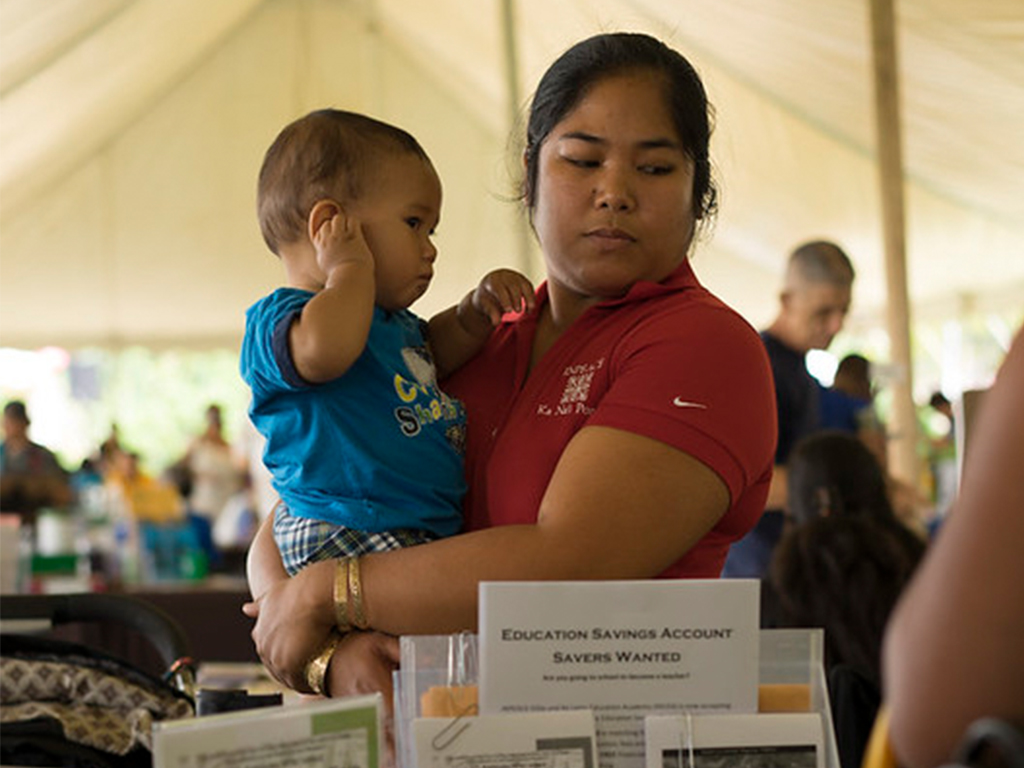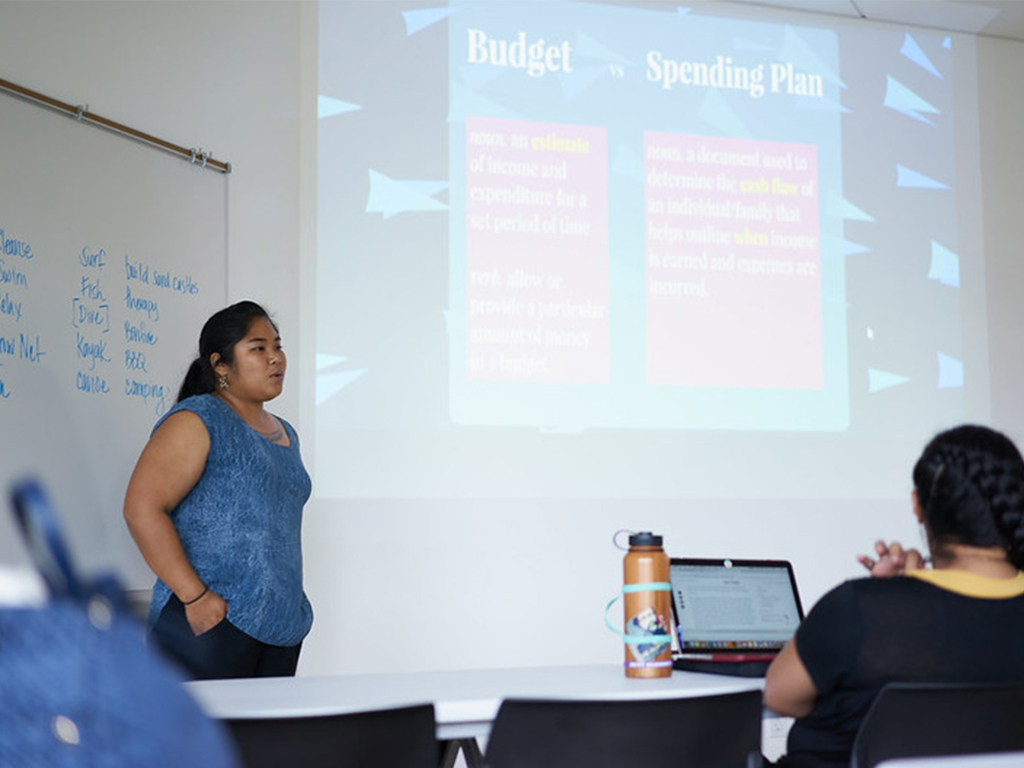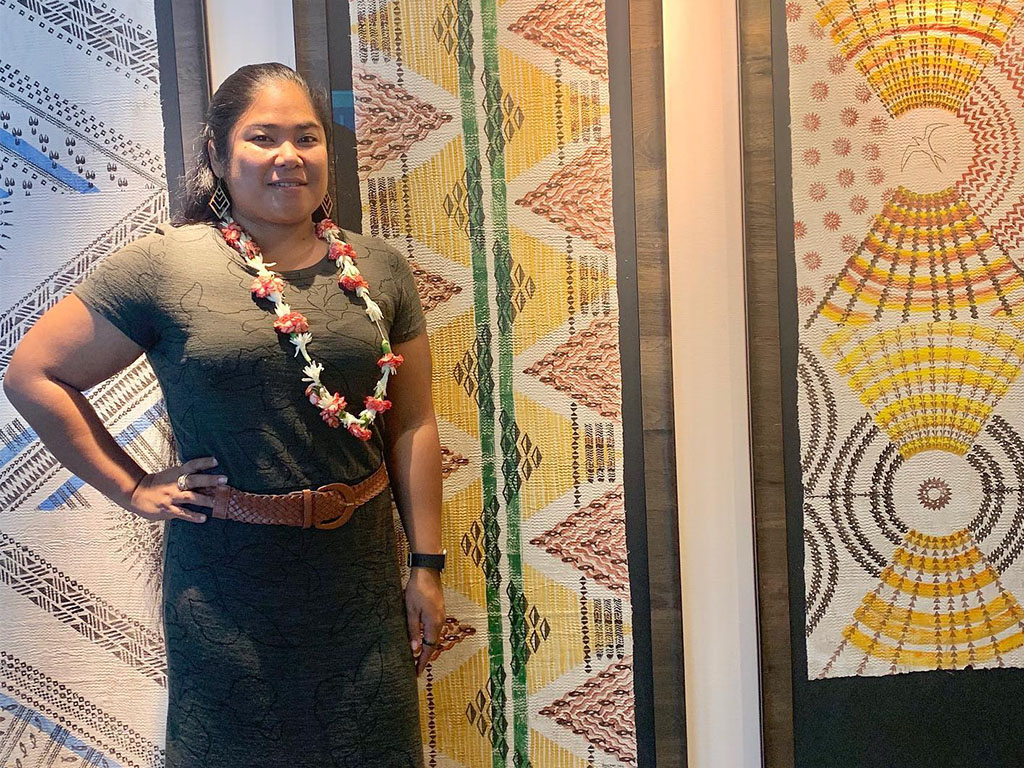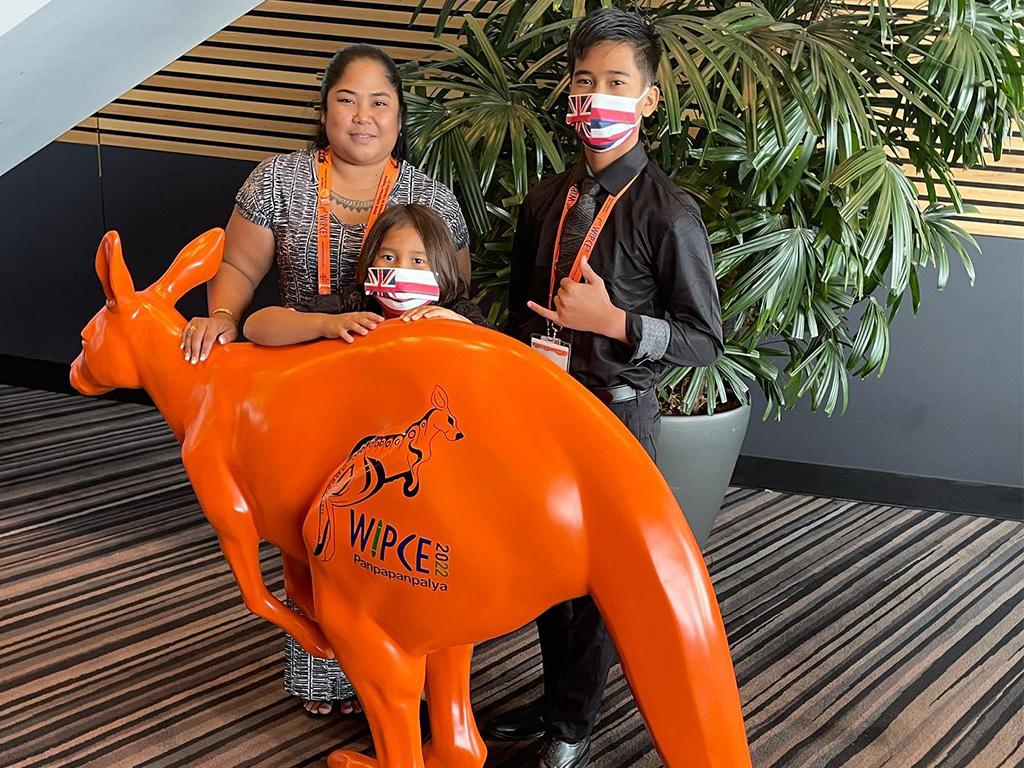Saydee Pojas (MA ʻ13), Chief Operating Officer at INPEACE, Institute for Native Pacific Education and Culture, first learned of the nonprofit organization when her first child was a toddler in 2009. Her son enrolled in the INPEACE Keiki Steps Program. Seeing her son benefit from Keiki Steps, Pojas soon took a staff position in the program, working as an ʻohana advocate responsible for developing and delivering a parent curriculum for the parent participation preschool program.
“I could take my keiki to work and could be involved in his early years of education, and I could also have a job, an income to support my ʻohana,” Pojas said.

Saydee Pojas representing the Ho'ala at INPEACE program at a community outreach event.
From ʻohana advocate, she moved into the community recruiter position with a brand new program called Hoʻāla at INPEACE. Pojas passionately worked with families of children up to 5 years old on the Waianae Coast to inform them of early childhood education programs, including available tuition assistance and help completing applications and registration paperwork.
“Through my own son’s participation in Keiki Steps, I could share firsthand the opportunities of participation in early childhood programs, benefiting my keiki and also our family,” Pojas said. “I want to see other keiki and families benefit from early childhood programming and education.”
For her own higher education, Pojas had earned a bachelorʻs degree in business administration from Chapman University in Southern California in 2006. Several years after graduating, she casually considered pursuing a masterʻs degree and researching her options.
“One of my colleagues encouraged me to look into what HPU had to offer,” she said. Pojas did, searching the web, and came across Hawaiʻi Pacific Universityʻs graduate program in the College of Business focused on organizational change. “That is what I wanted to learn about,” she shared. “I was new in the nonprofit world and the Native Hawaiian nonprofit world and could see how Organizational Change could benefit the sector.”
Within three months, Pojas had applied, been accepted, and enrolled in the accelerated-term, fully online masterʻs program at HPU. The programʻs format suited her lifestyle, allowing her to continue working and being a mother to a young child and pregnant with her second child. Pojas was not deterred by the fast pace and high volumes of work in a condensed time frame, including book readings, posting online on course boards, writing case studies and papers, and participating in group projects.
“It was very rigorous,” she said. “But I liked it because I was in there with a mixture of people, a lot of military, some international students, and a handful of us local students. Thinking about organizational change and the experience that all of the different people brought in was really interesting, and having that diversity in the class really helped.”
Five months after earning her HPU masterʻs degree, an opportunity arose for INPEACE to pursue federal funding for a five-year, multi-million dollar grant that would allow the creation of a new financial literacy program for the Native Hawaiian community. The executive team of INPEACE approached Pojas, who had just given birth to her second child, knowing her background and interest in financial literacy.
“I had never written a grant before. I just had a baby,” she recounted. With the help of colleagues who had grant writing experience, she decided to go for it. They wrote the grant, and INPEACE received the award to create and implement the Hoʻolu Waiwai, a Family Economic Capacity Building Program. Pojas was named its Program Director. Here was an opportunity for her to utilize what she had learned through her masterʻs in organizational change program, developing and implementing the Hoʻolu Waiwai Program.

Saydee Pojas conducting a financial literacy presentation to attendees of an INPEACE Ho'olu Waiwai Program; Pojas was previously the program director of the family economic capacity building program.
Other organizations in the community were doing similar work, delivering financial literacy programs. “I had to understand where this program fit into the bigger picture,” she said. “How was the community going to receive the programming that I was about to deliver? A lot of the concepts I learned from the organizational change program were things I got to implement pretty quickly.”
Fast forward almost ten years since Hoʻolu Waiwai launched, the program continues to thrive, providing culturally relevant financial education and coaching for individuals and families. Even when the COVID-19 pandemic hit the world by surprise, including 2020 stay-at-home government orders in Hawaiʻi, the program that started in Waianae quickly pivoted online, increasing its service and reaching additional communities across Hawaiʻi and even internationally.
“While I donʻt run the program anymore, I call it my other baby because I really helped to grow it and design the program,” she reflects.
Now serving as COO at INPEACE, Pojas builds upon everything she has learned and the skills and experiences she gained over the years at INPEACE to help advance the mission of the organization she deeply cares about, empowering communities through education and culture. Pojas also appreciates the family-oriented values of INPEACE, finding a good fit with her values and lifestyle.
“Iʻve learned over the years, itʻs not what you do, but itʻs where you are at,” Pojas said about the organization she has committed to for 14 years. “You need to like what you do, but the environment you are in is going to be really important.”




